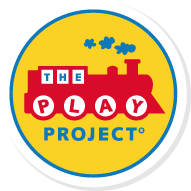By Onna Solomon, MSW
As we enter into the fall season, everyone is gearing up for the new school year. So often, this means a focus on academic testing, and an emphasis on skill-building and performance. Many parents worry about their children’s ability to perform, and many children feel stressed by the academic tasks expected of them.
In this context, I have been thinking about The PLAY Project’s focus on joyful connection and spontaneous playful interaction, two goals that I believe are not emphasized enough in the pursuit of educating our children. What many people don’t know is that playfulness serves a crucial role in developing a brain that is primed for creativity, spontaneity, and novelty.
So what is the definition of “play”? What does it mean to be truly playful?
In his thoughtful essay, “The Value of Play,” Peter Gray, PhD, defines play as follows:
“(1) Play is self-chosen and self-directed; (2) Play is activity in which means are more valued than ends; (3) Play has structure, or rules, which are not dictated by physical necessity but emanate from the minds of the players; (4) Play is imaginative, non-literal, mentally removed in some way from ‘real’ or ‘serious’ life; and (5) Play involves an active, alert, but non-stressed frame of mind.”
I find particularly important this definition’s emphasis on play being self-chosen and involving a “non-stressed frame of mind.” Basically, what Gray is describing is the act of engaging in an activity mainly because it is fun. But, why, you might ask, is this pursuit of fun important? What value does it have other than pleasure? It turns out, it has great value in building essential capacities for learning.
Gray goes on to explain that it “has been shown repeatedly, in many psychological experiments” that “strong pressure to perform well (which induces a non-playful state) improves performance on tasks that are mentally easy or habitual for the person, but worsens performance on tasks that require creativity, or conscious decision making, or the learning of new skills. In contrast, anything that is done to reduce the person’s concern with outcome and to increase the person’s enjoyment of the task for its own sake—that is, anything that increases playfulness—has the opposite effect.”
This means that an overemphasis on measuring outcomes and evaluating performance can actually harm the process of learning new skills, while also limiting creative thinking.
So, as you begin the school year, don’t forget to make room in your day for play—not only is it fun, but it is essential for developing the kind of creative problem-solving skills we all want for ourselves and our kids!
